LiberatED: Higher Education, Ethnic Studies and the Academic March Toward Intolerance
Investigations
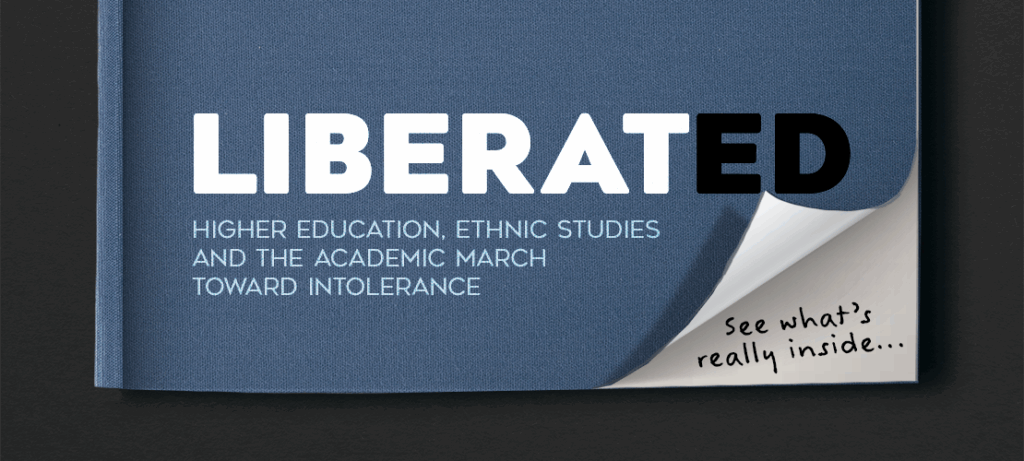
Institutions in the report: 55
Total number of states: 19
Grant funding for ethnic studies: $19,289,825
SUMMARY
Across the country, ethnic studies, especially “liberated” or “critical” ethnic studies, is becoming more ingrained into higher education. While some institutions only offer a handful of ethnic studies courses, others such as San Francisco State University, have their own departments dedicated to this area of study.
Primarily born out of the late 1960s radical student protests, ethnic studies is being used to push far-left political ideology into higher education classrooms, into majors, and down into K-12 schools. Often sold to the public as “history” and “culture,” course syllabi often look more like anti-American, radical leftist political indoctrination than an attempt to explore the rich history and culture of minority groups in the US.
Some universities, such as the University of Wisconsin, require ethnic studies as a general education requirement. Other institutions offer various ethnic studies courses as options to fulfill their general education requirements.
The purpose of this report is to highlight, explain, and expose liberated, or critical, ethnic studies and its far-left political programming. The report also includes exposing how some institutions are influencing K-12 ethnic studies curriculum, courses, and teaching pedagogy at the state and local level.
For example, the University of Minnesota – Twin Cities’ “Ethnic Studies Initiative” provides teachers with free lesson plans that promote student activism for far-left causes and links to controversial people and groups.
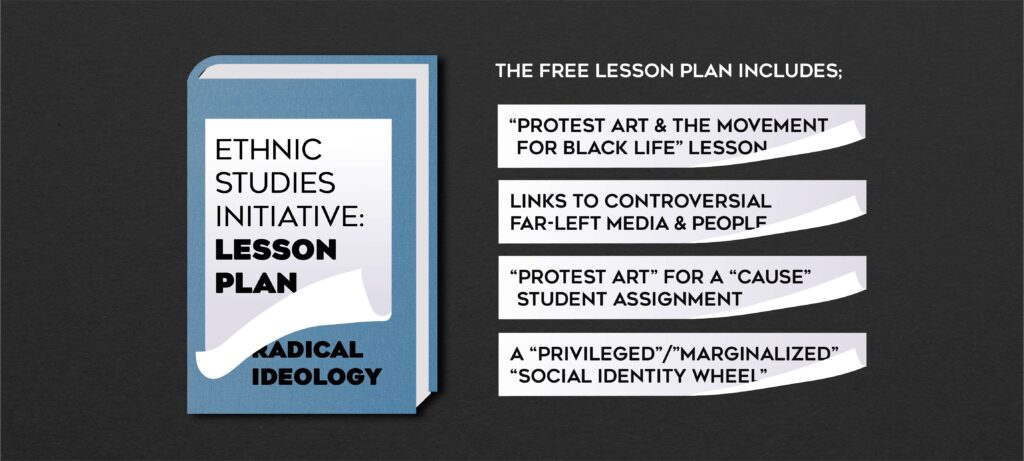
Grant Funding
Since 2020, nonprofit foundations such as The Andrew W. Mellon Foundation and William & Flora Hewlett Foundation distributed over $19 million to universities in support of ethnic studies programs and departments.
For example, the Mellon Foundation gave the City University of New York $8,000,000 since 2020 to “support the further development of ethnic studies across the CUNY system.”
The Mellon Foundation also donated $1,500,000 to the California State University system for the “expansion of programs in Ethnic Studies — including their intersections with Gender and Sexuality Studies — across university campuses and in collaboration with community colleges.”
Additionally, the Mellon Foundation granted Salem State University (MA) $3,000,000 for the “establishment of a national network of regional comprehensive universities that develop undergraduate-focused digital humanities with an emphasis on ethnic studies and community engagement.”
In 2023, the WK Kellogg Foundation gave The Regents of New Mexico State University $250,000 to “provide core support for the Borderlands and Ethnic Studies Research Center to address inequities in PreK-12 schools by developing culturally responsive place-based lessons so teachers have curricula to meet state standards, and students have the opportunity to break cycles of racial/ethnic inequity.”
EXAMPLES
Below are several examples of university ethnic studies departments facilitating curriculum, lessons, workshops, and professional development for K-12 school districts and teachers.
University of California, Berkeley
High School Ethnic Studies Initiative
The University of California, Berkeley’s High School Ethnic Studies Initiative is a “collaboration between The American Cultures Center, Department of Ethnic Studies, and History-Social Science Project developing curriculum materials to support Bay Area teachers and school districts”
The University’s “Ethnic Studies Library” features a webpage titled High School Ethnic Studies Initiative Library Guide which states that it was designed to “support the High School Ethnic Studies Initiative (HSESI), a partnership between the Department of Ethnic Studies, the American Cultures Center, and the History-Social Science Project.”
The page includes a link to the UC Berkeley HSESI Resource Hub, a “curated collection of materials designed to support students and instructors in preparation for the rollout of California’s high school Ethnic Studies graduation requirement.” The aim of the hub is to “foster a deep understanding of oppression, liberation, and the intricate tapestry of social movements that shape society.”
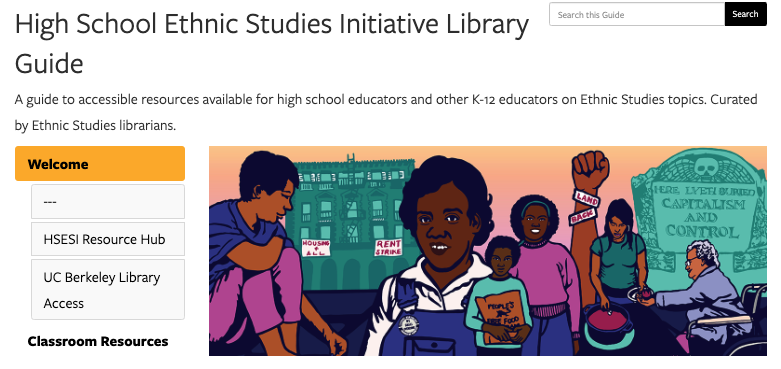
UC Berkeley HSESI Resource Hub
The UC Berkeley HSESI Resource Hub is a “curated collection of materials designed to support students and instructors in preparation for the rollout of California’s high school Ethnic Studies graduation requirement” and “offers diverse content types, including recommended readings, digital data tools, presentations, and archives of audio, videos, and images related to the history and practice of teaching Ethnic Studies.”
Resources featured or promoted in the hub include “Drag Pedagogy: The playful practice of queer imagination in early childhood,” “equitable grading resources,” “Liberated Ethnic Studies Model Curriculum Consortium,” Paulo Freire’s Pedagogy of the Oppressed, “Revolutionizing Education – Youth Participatory Action Research in Motion,” “Teach Palestine” and “Whiteness as Property.”
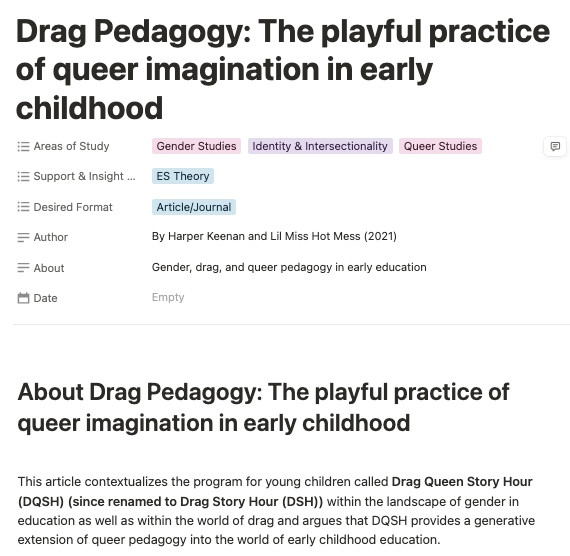

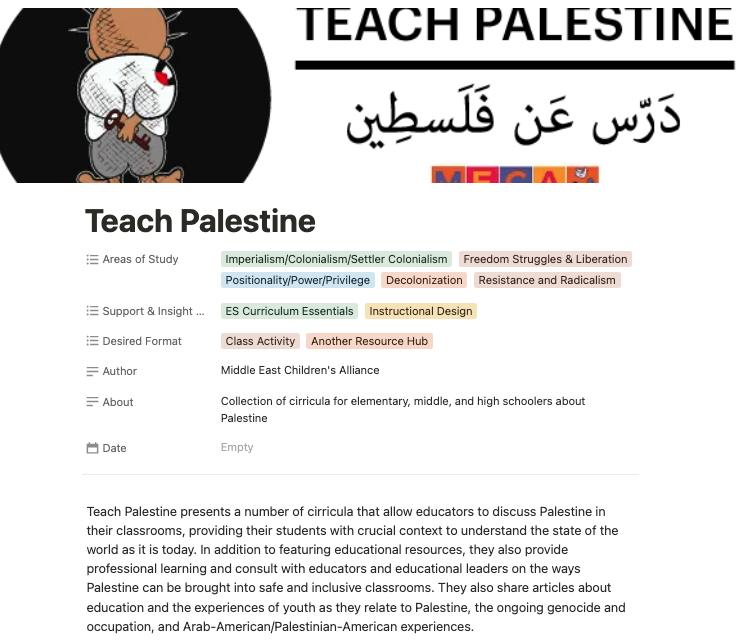
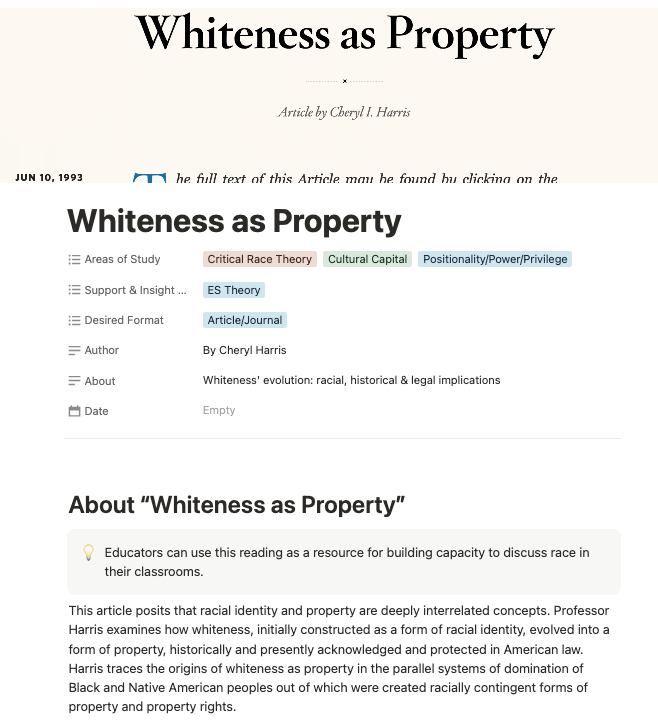
University of Minnesota – Twin Cities
Ethnic Studies Initiative
The College of Liberal Arts’ Race, Indigeneity, Disability, Gender & Sexuality Studies (RIDGS) “Ethnic Studies Initiative” is meant to unite “various stakeholders around the pursuit of creating free, accessible, and Minnesota-specific ethnic studies lesson plans and other resources aligned with the State Standards and Benchmarks in Social Studies.” It works “directly with K-12 teachers, staff, and students to ensure our programming meets their immediate and long-term needs.”
The initiative is “dedicated to creating educational resources that are not hidden behind paywalls and are reflective of the rich histories of Minnesota students and their communities.”

The Initiative, funded by the Minnesota Humanities Center via the Arts and Cultural Heritage Fund, provides teachers with free lesson plans and resources to teach ethnic studies courses in their respective schools.
A sixth-grade lesson plan titled “Protest Art & the Movement for Black life” states that it focuses on the “Movement for Black Lives and the role of protest art in mediating power in the city” and about the “13 guiding principles of the Black Lives Matter movement.”

Learning goals for the lesson include students learning about the “guiding principles of the Black Lives Matter movement.”


Additional course documents include the “Social Identity Wheel Activity Guide” which prompts the students to identify their different identities including if they fall into a “privileged” or “marginalized” group.

Also included in lesson resources are links to controversial far-left individuals such as Jesse Hagopian, and the radical far-left media group, Unicorn Riot.

One of the course assignments includes students creating “Protest Art” for a “cause” of the student’s choosing. Suggestions include “creating liberatory art meant to make people feel safe in spaces that they do not already feel safe or welcome in.”
A slide offers students some “optional” themes and causes such as “Black Lives Matter,” “People Over Property,” “Defund the Police,” and “All Power to the People.”


City University of New York
Black, Race, and Ethnic Studies Initiative (BRESI)
In 2020, the Andrew W. Mellon Foundation gave the City University of New York’s BRESI (the Black, Race and Ethnic Studies Initiative) a $3,000,000 grant to fund “conversations, processes, strategic thinking, program development, new collaborations, and broadly distributed grant-giving to incite change across 25 campuses and graduate programs.” The Mellon Foundation gave another $5,000,000 grant to the Initiative in 2023.
Program areas covered under BRESI include student research and internships, “Programs, Departments and Special Initiatives,” and “Course and Curriculum Design and Curriculum and Syllabus Decolonization.”
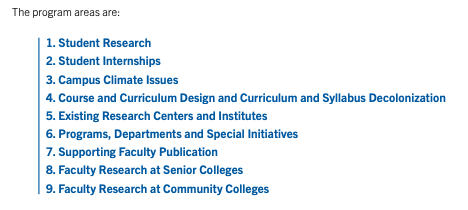
Using funds from the grant, the Initiative created the BRES Doctoral Fellowship Program which “supports the research of early-career students” and “provides funding to doctoral students from any program within the Humanities and Social Sciences.”
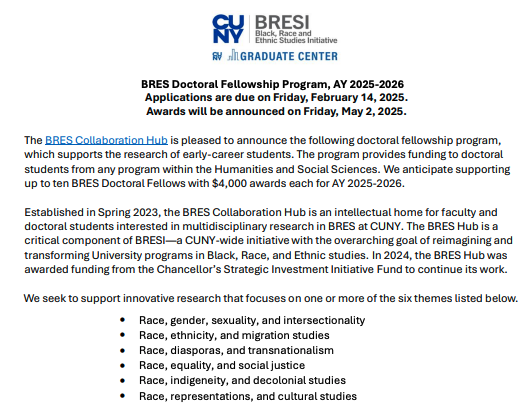
Another part of the initiative included “Course and Curriculum Design and Curriculum and Syllabus Decolonization.” BRESI awarded grants to “update existing courses or create new ones, leveraging the extensive curriculum transformation expertise within CUNY.” This included expanding “Latinx Studies” by starting a “certificate in Latino Studies at Lehman College and further develop the Latin American, Caribbean and Latina/o Studies Program at the College of Staten Island.”
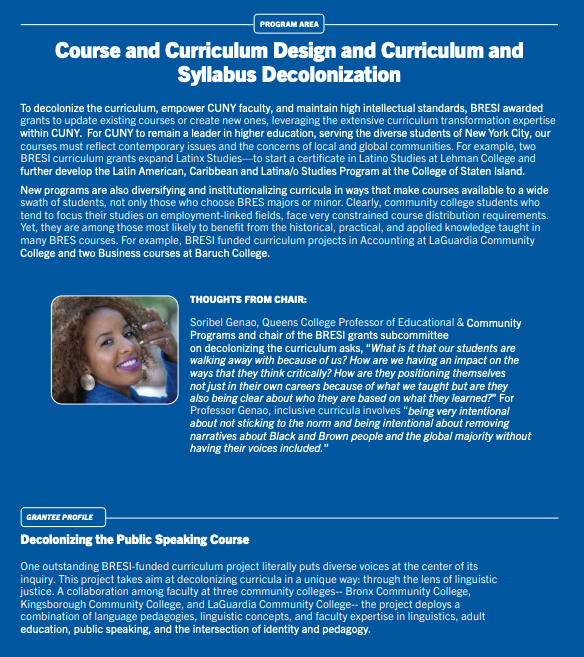
BRESI grants have been awarded for a variety of far-left research projects such as:
- “Creating Culturally Relevant-Sustaining Teacher Preparation Programs”
- “Accounting Program DEI Accelerator”
- “Talking About Race: Antiracist Approaches to Facilitating Challenging Classroom Discussion”
- “Cripping the Curriculum: A Call for a Paradigm Shift Toward Decolonizing the Public University”
- “Decolonizing the John Jay English Major: Creating Foundational Introductory Courses”
- “The Queens Climate Justice Fellowship”
- “Addressing Racism on Campus with Restorative Practices”
- “Advancing Antiracism, Diversity, Equity, Inclusion, Social Justice, and Belonging (A/DEISJ+B)”
- “Efficacy of Using 3D Simulations to Support Teaching for Social Justice in the Preparation of PreService Educators”
- “No Justice, No Peace: U.S. Third World Student Movements’ Radical Challenge to Reading for Tolerance”
Degrees and Courses
The Borough of Manhattan Community College campus offers an Associate in Arts degree in Ethnic Studies.
ETH 100 – Introduction to Ethnic Studies
The required course ETH 100 – Introduction to Ethnic Studies “explores the historical formation of ethnic studies in the United States” and “examines the academic field of Ethnic Studies by raising questions about the ways that race and racism shape our experiences and world across a range of time and places.” The course “is concerned with how these groups struggle to stake out their place in a highly unequal world.”

UNIVERSITIES
Below is a non-comprehensive list of universities that offer ethnic studies programs, certificates, and/or courses. Click on the institution to view more information about how it implements ethnic studies programming and examples of courses.
Also included under select universities are any grant funds they have received from nonprofit foundations.
ARIZONA
Arizona State University
Northern Arizona University
CALIFORNIA
California State University System
- 2023 – The Andrew W. Mellon Foundation – $1,500,000 (institutions marked with an * received funding from this grant)
California State University Monterey Bay
California State University San Marcos
De Anza College
Diablo Valley College
Loyola Marymount University
- 2021 – William & Flora Hewitt Foundation – $300,000
- 2022 – William & Flora Hewitt Foundation – $320,000
- 2023 – William & Flora Hewitt Foundation – $400,000
Modesto Junior College
Moorpark College
Sacramento State University*
San Francisco State University*
University of California, Berkeley
University of California, Davis
University of California, Irvine
- 2020 – William T Grant Foundation – $263,135
- 2021 – William T Grant Foundation – $333,701
- 2022 – William T Grant Foundation – $117,218
- 2023 – William T Grant Foundation – $330,946
University of California, Merced
University of California, Riverside
University of California, San Diego
University of California, Santa Cruz
University of San Diego
Westmont College
COLORADO
Colorado State University
University of Colorado Boulder
FLORIDA
Florida Atlantic University
University of Central Florida
HAWAI’I
University of Hawai’i at Manoa
MASSACHUSETTS
Harvard University
Salem State University
MICHIGAN
Kalamazoo College
University of Michigan
MINNESOTA
Augsburg University
Macalester College
Metropolitan State University
Minnesota State University – Mankato
St. Cloud State University
University of Minnesota – Twin Cities
NEBRASKA
University of Nebraska – Lincoln
NEW MEXICO
New Mexico State University
NEW YORK
City University of New York
- 2020 – The Andrew W. Mellon Foundation – $3,000,000
- 2023 – The Andrew W. Mellon Foundation – $5,000,000
OHIO
Bowling Green State University
The Ohio State University
OREGON
University of Oregon
PENNSYLVANIA
Penn State University – Abington
Shippensburg University
RHODE ISLAND
Brown University
TEXAS
Sam Houston State University
University of Houston
University of Texas at El Paso
UTAH
University of Utah
WASHINGTON
Bellevue College
Washington State University
WISCONSIN
Madison Area Technical College
University of Wisconsin – Madison
University of Wisconsin – Milwaukee
University of Wisconsin – Parkside
Stay Informed
